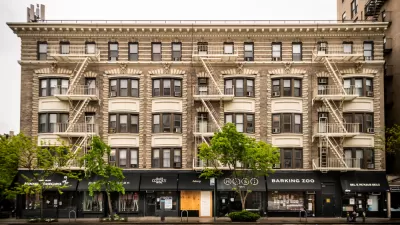Larry Kosmont shares what cities need to do to meet escalating state requirements; add housing density; fix shopping centers; replace sales tax; pay for constituent services; plan for the future; and capture value created by economic restructuring.

California cities are currently being challenged to respond creatively to "post-COVID" development trends and new state housing policies. To constructively contribute to the obvious need for a local mind-reset, VX News sat down with Larry Kosmont to afford him an opportunity to speak on what cities need to do to in order to capture value from this changing economy and how to do this to increase the housing stock and improve livability across California.
Kosmont goes into some of the clever ways cities can use existing zoning and tax measures to get additional funding and support from developers to get more housing and improve density, but also to get support for open spaces, transit infrastructure, and more. He explains how this "carrot" approach can be a win-win for cities to get more investment into projects they need done and developers can have certainty knowing the areas they are putting these projects will see continued investment by the city. One of the tools that he recommends for this process is the creation of Enhanced Infrastructure Financing Districts (EIFDs).
At the end of the interview, Kosmont takes some time to go through his thoughts on some recent California housing policy topics such as the Surplus Land Act, state intervention in the creation of more housing, and the future of local economic development. He discusses the way in which, by complicated means, the Surplus Land Act is allowing cities to go through their assets and really assess what they do and do not need. At the end of the day, he sees the best way for creating new development and helping the crisis as being through local cooperation with private developers to get housing actually completed and on the market.
You can find the full interview here.

Alabama: Trump Terminates Settlements for Black Communities Harmed By Raw Sewage
Trump deemed the landmark civil rights agreement “illegal DEI and environmental justice policy.”

Study: Maui’s Plan to Convert Vacation Rentals to Long-Term Housing Could Cause Nearly $1 Billion Economic Loss
The plan would reduce visitor accommodation by 25% resulting in 1,900 jobs lost.

Why Should We Subsidize Public Transportation?
Many public transit agencies face financial stress due to rising costs, declining fare revenue, and declining subsidies. Transit advocates must provide a strong business case for increasing public transit funding.

Paris Bike Boom Leads to Steep Drop in Air Pollution
The French city’s air quality has improved dramatically in the past 20 years, coinciding with a growth in cycling.

Why Housing Costs More to Build in California Than in Texas
Hard costs like labor and materials combined with ‘soft’ costs such as permitting make building in the San Francisco Bay Area almost three times as costly as in Texas cities.

San Diego County Sees a Rise in Urban Coyotes
San Diego County experiences a rise in urban coyotes, as sightings become prevalent throughout its urban neighbourhoods and surrounding areas.
Urban Design for Planners 1: Software Tools
This six-course series explores essential urban design concepts using open source software and equips planners with the tools they need to participate fully in the urban design process.
Planning for Universal Design
Learn the tools for implementing Universal Design in planning regulations.
Smith Gee Studio
Alamo Area Metropolitan Planning Organization
City of Santa Clarita
Institute for Housing and Urban Development Studies (IHS)
City of Grandview
Harvard GSD Executive Education
Toledo-Lucas County Plan Commissions
Salt Lake City
NYU Wagner Graduate School of Public Service





























